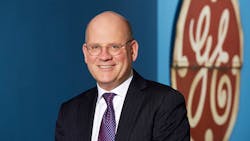GE Pushes Ahead on Revamp With $1.05 Billion Sale of Health IT
John Flannery’s reshaping of General Electric Co. is getting underway.
After taking the helm last year, the chief executive officer promised to shed businesses from lighting to locomotives in a bid to simplify the beleaguered manufacturer. Complexity, he said, was at the root of many of GE’s problems.
He started following through on Monday when one of the company’s largest divisions, GE Healthcare, announced a deal to sell a trio of information-technology businesses to private-equity firm Veritas Capital. The $1.05 billion cash transaction is expected to close in the third quarter, the companies said.
The sale marks one of the first significant portfolio moves since Flannery trumpeted a plan to exit at least $20 billion of businesses. The revamp, along with cost cuts and culture change, is a pillar of Flannery’s bid to pull GE out of one of the deepest slumps in its 126-year history. The company has languished at the bottom of the Dow Jones Industrial Average for more than a year as it grapples with cash-flow challenges and weak demand for industrial equipment.
Veritas, which recently invested in Truven Health Analytics and Verscend Technologies, plans to buy GE Healthcare’s assets in ambulatory care management, enterprise financial management and workforce management. The investment firm said it would work with GE executives to form a stand-alone business with the units.
The new company should benefit from an “urgent need to digitalize our health-care system,” Veritas CEO Ramzi Musallam said in the statement.
The GE assets are focused primarily on hospital workflow and administrative IT functions. With the sale, GE Healthcare plans to sharpen its focus on software related clinical care, including connected devices, enterprise imaging and “smart diagnostics.”
Health care has long drawn scrutiny from GE investors. The division, the company’s third-largest with 2017 sales of $19 billion, is a solid cash-generator and boasts high-growth markets such as life sciences. But some shareholders and analysts have argued that it doesn’t fit as well with GE’s primary business of making industrial equipment such as jet engines and gas turbines.
While Flannery said in November that health care would remain a focus for GE, along with energy and aviation, he has since suggested that he would be open to dividing up the company into separately traded businesses. Flannery ran GE Healthcare for about two and a half years before being tapped to succeed CEO Jeffrey Immelt.
By Richard Clough
About the Author
Bloomberg
Licensed content from Bloomberg, copyright 2016.
